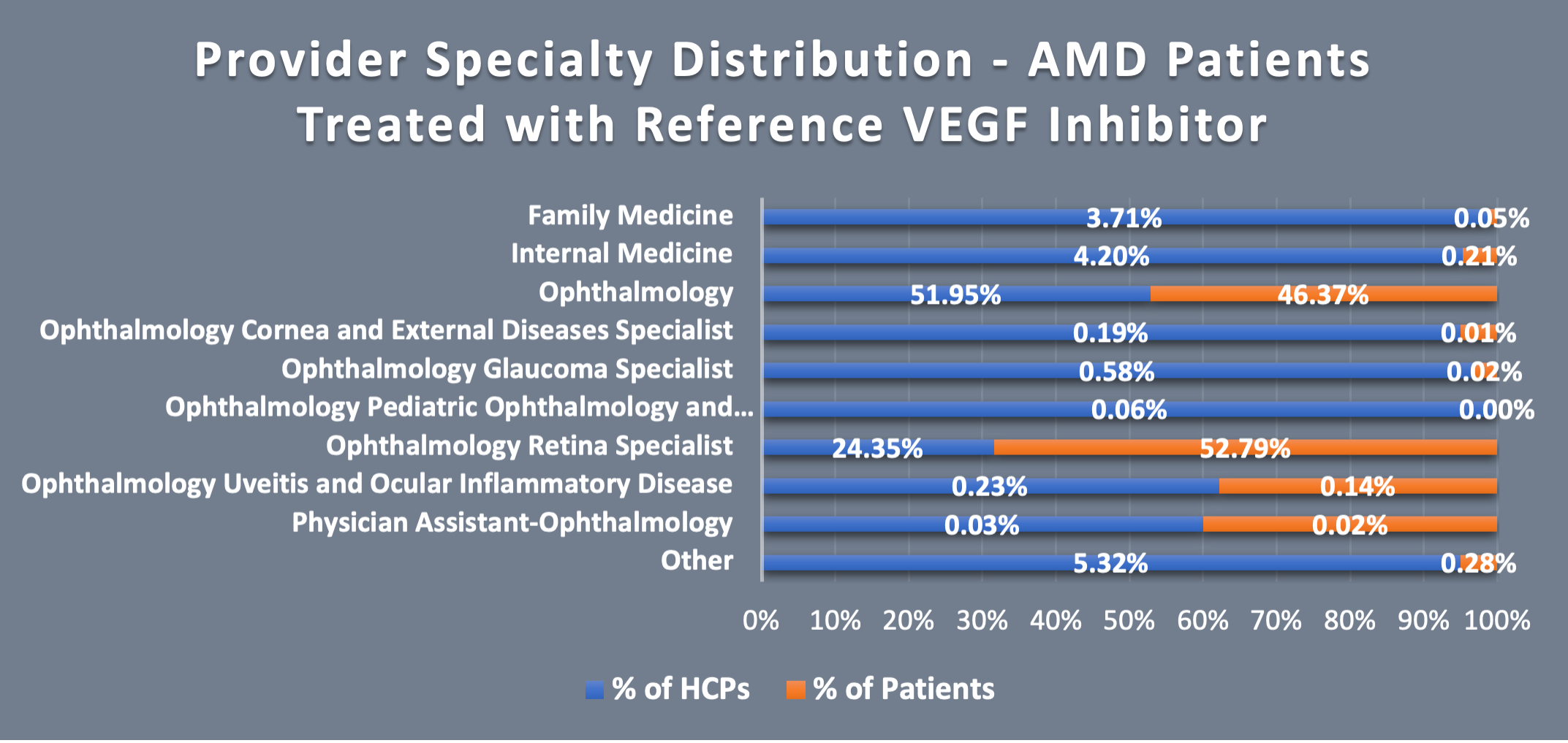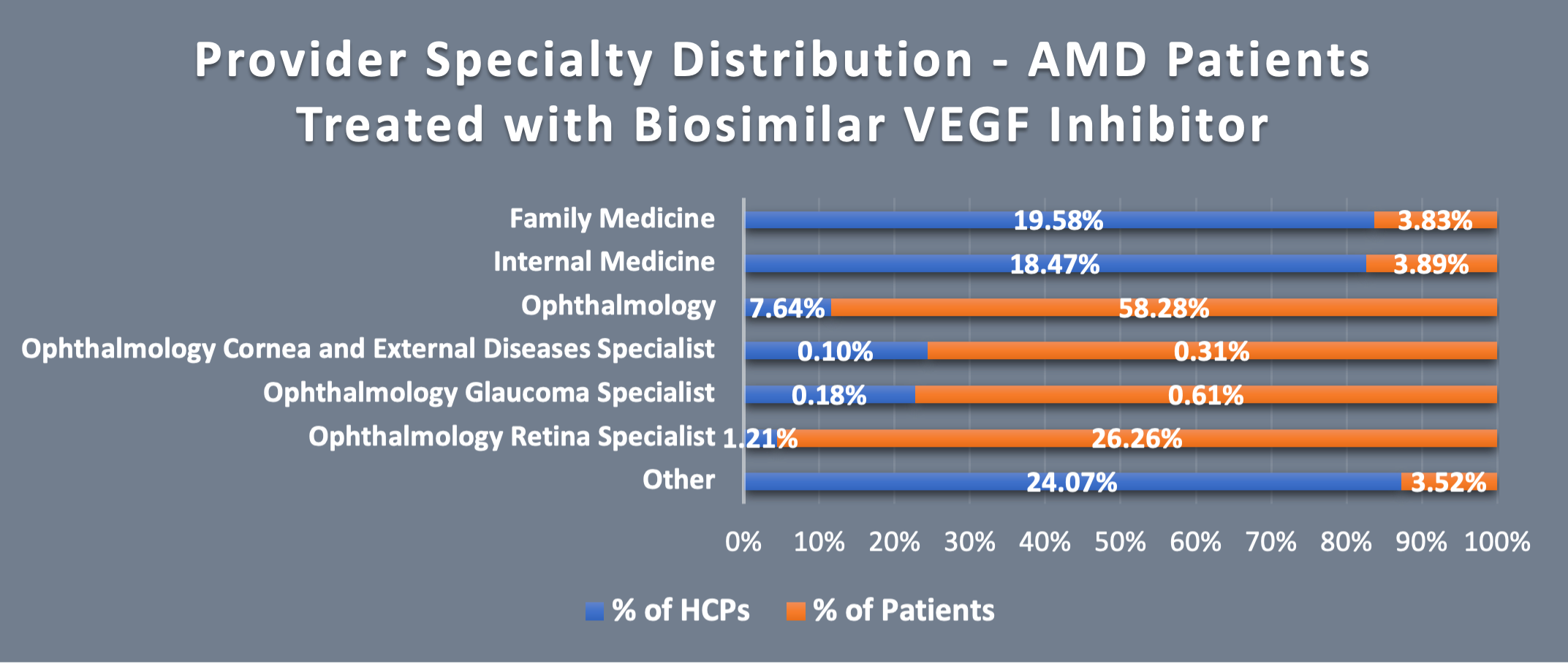February is low-vision month, and at PurpleLab we are focusing on Age-Related Macular Degeneration (AMD), one of the diseases responsible for this condition. According to the Centers for Disease Control’s (CDC) Vision and Eye Health Surveillance System (VEHSS) about twenty million Americans aged forty and older are living with AMD; 1.5 million of which are diagnosed with neovascular AMD, the less common but later-stage vision threatening form. Treatment includes biologic medications called VEGF inhibitors, high-cost specialty medications that require direct injection into the eye to reduce progression of the disease. Because of the high cost and complex drug administration, it is key to identify experienced provider specialty practices that are well informed to identify and care for patients with this disease.
How the HealthNexus Platform Provides Deeper Insights
In our last post, Emerging Biosimilars and the Importance of Identifying Experience Providers, the Clinical Team at PurpleLab highlighted the expansion of specialty biologics and biosimilars. VEGF inhibitors are one of several therapeutic classes that have biosimilar options. In support of Age-Related Macular Degeneration (AMD) Awareness Month, we looked at five years of data, specifically at providers who care for patients diagnosed with AMD, then analyzed prescribing for both reference and biosimilar VEGF inhibitors using PurpleLab’s HealthNexus reporting platform. Interestingly, we found that for reference VEGF inhibitors, prescribing is concentrated in ophthalmology and ophthalmology specialist providers, whereas, for biosimilars, the majority of prescribers are internal and family medicine specialists. For purposes of the analysis, we combined provider specialists outside of reported categories as other.
Figure 1. Healthcare Provider Specialty – AMD and Reference VEGF Inhibitors
Figure 2. Healthcare Provider Specialty – AMD and Biosimilar VEGF Inhibitors
There may be many reasons for VEGF inhibitor biosimilar adoption variation across providers, their short time on the market, desire for longer-term safety and efficacy data (switching studies), less than expected financial savings, and based on survey data, some specialists not being in favor of interchangeability for a prescribed reference biologic. Having this information allows provider organizations to develop a strategy that can address unexpected findings like this, focusing on provider awareness that biosimilars offer a prescribing option for lower cost alternatives. In addition, pharmaceutical companies can use this information to identify which specialties are shifting to newer agents and the impact that may have on prescribing patterns. Patients should also be aware that while these medications are available, not all providers may be using them at the present time. Information like this can help in selecting the provider that is right for the patient.
Putting it All Together
Using real-world data (RWD) enables all stakeholders in the healthcare arena to be more proactive, informed, and make educated decisions based on the data available. Being proactive with eye health can detect problems sooner, allowing providers to better manage conditions like AMD. The American Academy of Ophthalmology (AAO) recommends children and adults get regular eye exams to identify problems early and maintain good eye health. For those 65 and older, yearly exams with an ophthalmologist to check for age-related eye diseases like AMD and other conditions such as diabetic retinopathy, glaucoma, and cataracts. Most importantly, eye health is closely linked to overall health. Some eye conditions may be due to an underlying health problem such as hypertension or diabetes, which if detected early, can be treated more successfully.
Awareness and Vision Rehabilitation Resources
The Academy of Ophthalmology publishes information about how to be proactive with eye health, recommended techniques to help with low vision and a sponsored program, EyeCare America for seniors with degenerative eye diseases that provides low-cost or no out-of-pocket cost eye exams to eligible seniors. PurpleLab finds that making patients, providers, and the healthcare industry aware of specific medical conditions can increase understanding of how to manage them. Please contact us to see how we can use our data to solve your healthcare needs.
Sources:
https://www.cdc.gov/visionhealth/vehss/estimates/amd-prevalence.html
https://www.reviewofophthalmology.com/article/an-update-on-the-antivegf-biosimilar-pipeline
https://www.fiercepharma.com/pharma/physicians-not-board-biosimilars-sermo-survey-says
https://www.aao.org/eye-health/diseases/amd-macular-degeneration

